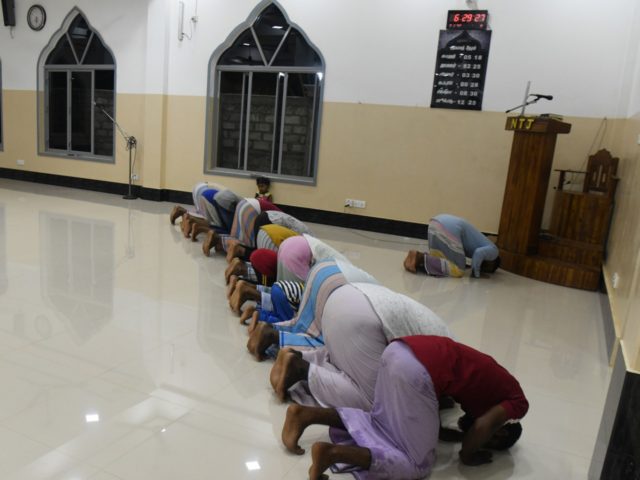Sri Lanka’s Home Affairs Minister Vajira Abeywardena revealed Sunday that the country had deported 200 Islamic clerics in the wake of the Easter Sunday jihadist attacks against Christians over concerns they had the potential to radicalize locals.
Muslim terrorists killed 257 people on Easter Sunday in suicide bombings targeting three churches and three hotels where Christians were enjoying an Easter brunch. Sri Lankan authorities initially blamed the attacks on a domestic group known as National Thawheed Jama’ath (NTJ), but the Islamic State later took credit for the killings, releasing video footage of the founder of NTJ pledging allegiance to Islamic State “caliph” Abu Bakr al-Baghdadi.
Ensuring investigations revealed that foreign intelligence services had warned Sri Lankan officials of the attack weeks before, but no agency took action to prevent it. Authorities have seen been publicizing measures they have taken to ensure it has not happened again, including banning Islamic face veils, raiding mosques, and deporting questionable clerics.
The week after the bombings, local media revealed that 11 mosques near the NTJ headquarters outside of Colombo were known as “fundamentalist” or Wahhabist, referring to a radical Saudi strain of Islam.
“Considering the current situation in the country, we have reviewed the visas system and took a decision to tighten visa restrictions for religious teachers,” Abeywardena told the Agence France-Presse (AFP) on Sunday, confirming that Colombo had deported 600 people for potential ties to jihad, 200 clerics among them. He said that none of those expelled had broken the law to enter the country but did have expired visas, which the government chose not to renew. While he did not specify the nationalities of those removed, local media reported that many came from neighboring India and Pakistan, as well as Muslim countries like Bangladesh and the Maldives.
“There are religious institutions which have been getting down foreign preachers for decades,” he explained. “We have no issues with them, but there are some which mushroomed recently. We will pay more attention to them.”
Sri Lanka is a majority Buddhist country that came out of a decades-long civil war between Buddhists and Hindus only a decade ago. Christians and Muslims have long been minorities of comparable size that attract little attention from authorities, making the island nation a soft target for groups like the Islamic State.
The Sri Lankan news outlet Ada Derana reported Sunday that the head of NTJ, Mohamed Zahran Hashim, had openly established a terrorist training camp near his mosque. Police found a ten-acre estate in Kattankudy, home to a significant Muslim population and the NTJ’s headquarters, where they say Zahran and his followers experimented with explosives. The estate next to that land, Ada Derana noted, was also owned by a man recently arrested in Saudi Arabia, identified as a cousin of Zahran’s.
The Sri Lankan news agency also reported Monday that new evidence suggested Saudi Arabia had warned Sri Lankan officials of an imminent attack about five days before Easter. In the immediate aftermath of the attack, members of Prime Minister Ranil Wickremesinghe’s cabinet accused President Maithripala Sirisena of having evidence of a jihadist attack plot and not informing them about it. The cabinet members circulated a document they claimed came from Indian intelligence warning of an Easter Sunday plot. Zahran reportedly spent time in India recording jihadist sermons and uploading them to Youtube and Facebook.
Sirisena later claimed that his intelligence officials did not tell him of the alleged plot, either, and fired his police chief and defense secretary.
Sri Lankan police took a week to shut down the NTJ’s headquarters and raided the place just this weekend. Sri Lanka’s Daily Mirror reported Sunday that police arrested a man at the location Sunday and found evidence that jihadists were using the location for “making bombs, testing them, target practice and other illegal activities.”
The person arrested during that raid told police that Mohamed Rilwan Hashim, the brother of the suspected mastermind of the Easter bombing, had trained with his brother and blew up his hand and face on one occasion in 2007, losing several fingers and eyesight in one eye. The Mirror reported that police confirmed through hospital records that the claim was true – a man came to the local hospital with wounds clearly caused by an improvised bomb, received treatment, and was allowed to leave without police being notified of the incident.
Sri Lanka is currently preparing for nationwide elections, which President Sirisena asserted Saturday would go on as planned despite the threat of jihadist attacks.
“Elections cannot be postponed, therefore before the elections, I will bring about stability and I will eradicate terrorism,” Sirisena said in remarks to Reuters. “We have already identified all active members of the group and it’s a case of now arresting them.”
Sirisena admitted that up to 30 individuals with ties to the attack were “still at large” as of Saturday, but insisted that there is no intelligence suggesting they are planning further suicide bombings and that police are working to swiftly take them off the streets.
Sirisena said he would schedule elections between November and December.
While investigations continue, Christians have been unable to return to Mass on Sunday or send their children to school. Catholic clergy canceled Mass for the last two weeks, televising the service and urging believers to tune in. Schools reopened on Monday, but turnout was reportedly extremely low. In one school, Ada Derana reported, only 50 of the 3,000 students enrolled showed up for their first day since the attacks.

COMMENTS
Please let us know if you're having issues with commenting.